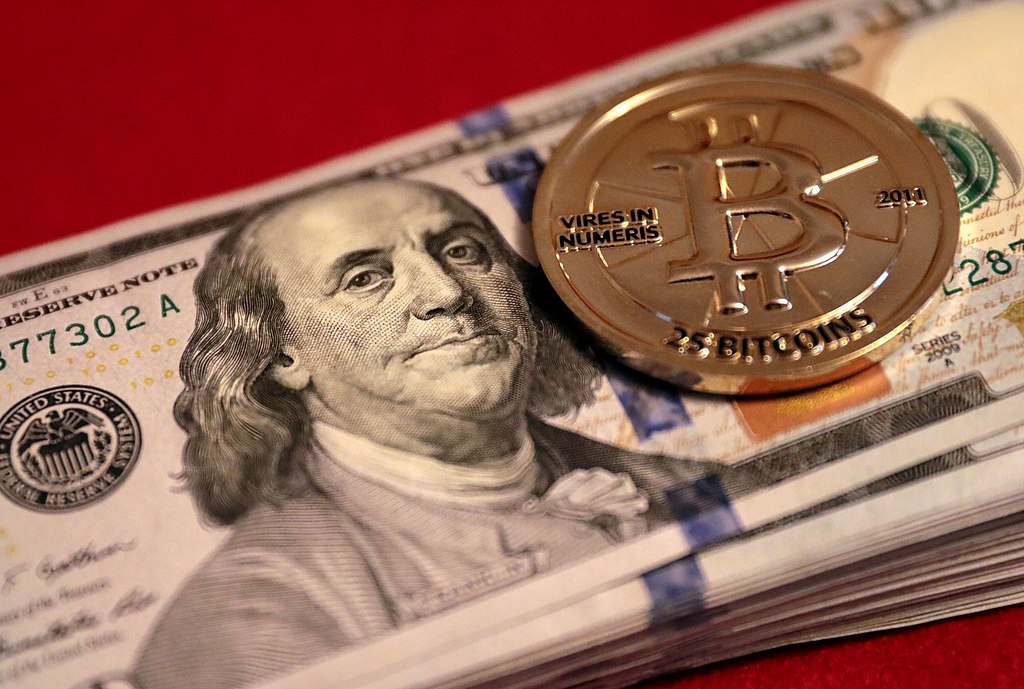
Bitcoin vs USD / Gage Skidmore / Wikimedia Commons
If you receive a monthly salary, did you ever stop to think about the meaning of the word? It goes back to the Latin word “salarium” which was the allowance paid to Roman soldiers to buy “sal” (salt).
(I’ll get to Bitcoin soon, but the story starts in the ancient times, so bear with me.)
Our earliest records of salt as money are in the Hebrew Bible dating to around 500 BC where “salt from a person” effectively meant payment. In order to keep the system going, salt production was controlled by the rulers.
The Sumerians and ancient Egyptians used grain as a medium of exchange. The grain was stored in temple granaries, and a receipt for the grain was used for payment. Africans used ivory, ochre, and livestock. The use of coins made of gold and silver dates back to 600 BC.
This ancient practice of deciding a medium of exchange and controlling production by the ruling elite continued to form the basis of modern monetary system up to the late 20thcentury.
After World War II, most first world countries were party to the Bretton Woods accord which tied the value of respective currencies to the US dollar, which in turn was backed by gold.
This changed abruptly in 1971. The US government had been printing money at a furious rate to pay for things like the Vietnam War and the space race. People around the world realised the dollar was no longer to be trusted, and began taking out their money in gold. Some $22 billion in gold fled the US in six months.
Then on 15 August, President Nixon issued an executive order, unilaterally withdrawing the US from Bretton Woods. The promise that the US dollar could be exchanged for gold was now meaningless.
And so we get to the problem with modern money and central banks: unlike salt or grain or gold or silver, a modern currency note has no intrinsic value.
The South African Reserve Bank prints money and controls the amount of money in circulation. Clause 224 of our Constitution requires the SARB to protect the value of the currency; which roughly means they cannot print money at a faster rate than economic growth, and they use interest rates to curb inflation.
Other countries are not so protected. Zimbabwe is the most visible example of a country where the currency, worth more than the rand in 1980, became valueless because the Mugabe government simply printed money. The same is happening in Venezuela today.
Now consider what happens if you wish to transfer money from yourself to me, and let’s assume that you bank with bank A and I with bank B.
You do an Electronic Fund Transfer (EFT). The money leaves your account immediately, but I get it two days later. On day 0, your bank earns interest on that money; on day 1, my bank earns interest on that money; on day 2, it shows up in my account. Oh, and we both pay transaction charges.
Bitcoin was created to bypass the tyranny of the banking sector.
First, Bitcoin creates a store of wealth that, like gold, has value and scarcity.
Gold does not deteriorate, i.e. rust; and there is a finite quantity of gold on earth. Bitcoin too.
Like Gold, Bitcoin is “mined”, but the mining happens electronically, in computers which need to solve a complicated mathematical problem to create new coins.
With gold mines, getting gold becomes more expensive as mine shafts go deeper underground. Bitcoin does the same by making it more difficult to solve the mathematical problem as each new coin is generated. And the nature of the mathematics means that only 21 million Bitcoins can be created.
Second, Bitcoin does not require a third party for money to change hands.
I can transfer money directly from my Bitcoin electronic wallet to yours; there is no fee payable to a bank or broker; the process takes as little as 10 minutes. And Bitcoin prevents a situation where a bank can avoid responsibility for a transaction.
Bitcoin achieves this by using technology called “blockchain”. If you understand how a ledger works in accounting, that’s exactly what blockchain does, except it’s a ledger that’s not controlled by any party to the transaction.
Currently, if someone with debit order on your bank account takes money without your permission, your options are limited. If the debit order is declined, the bank charges you a fee anyway. This is because the bank’s ledger has more authority than yours.
Not so with Bitcoin where any transaction has to be digitally signed by both parties, and independently verified in the blockchain.
So, like gold, Bitcoin has value because people agree it has value. The price of Bitcoin, like the price of gold, fluctuates with the markets. As I write this, the price of a single Bitcoin is around R160 000, but this price is still lower than its December 2017 peak of around R240 000.
Governments see Bitcoin as a massive threat. Like gold, it can be held securely without government being able to seize it. Unlike gold, Bitcoin can be transferred across the world immediately, with governments unable to track or interfere with such transactions.
Governments say, correctly, that Bitcoin can be used for money laundering. What is also true is that Bitcoin mitigates governments stealing your legally acquired wealth through taxation or expropriation.
Governments will continue to clamp down on its use, but the genie is out of the bottle. Cryptocurrencies like Bitcoin are here to stay, but this is the new wild wild west.
If you do choose to play in this space, please learn as much as you can before transferring any funds to anyone. There is money to be made, but money to be lost as well. A fool and his money are soon parted.
